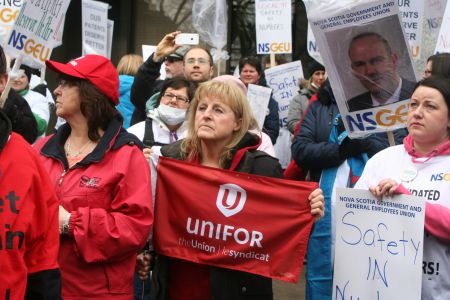K'JIPUKTUK, HALIFAX - 2300 nurses who work for Capital Health are out on strike.
Earlier this week the nurses walked out when the Liberal government introduced Bill 37, legislation that would effectively take away their right to strike. They were ordered back to work.
This time it's legal. But it will be quick.
Once proclaimed tomorrow, Bill 37 will make their strike illegal.
The nurses demand mandated nurse-to-patient ratios, arguing that without it too many hospital units operate short-staffed, puttting patients' lives at risk.
Many of those nurses came to Province House this morning to talk about patient safety.
But they also came to tell Premier Stephen McNeil and his Liberal Government how much they hate Bill 37.
This is not just about nurses in Halifax anymore.
That same Bill 37 will also effectively take away the right to strike from another 40,000 unionized health care and Community Services workers province-wide.
The legislation affects hospital staff province-wide, people who work in group homes, ambulance dispatchers, and many more.
Which is why banners and flags of just about every union active in Nova Scotia could be seen at the Province House rally.
Union activists are very angry.
News that members of the Annapolis Valley Labour Council occupied Health Minister Leo Glavine's constituency office was greeted with loud cheers.
"That's only the beginning," Rick Clarke, President of the Nova Scotia Federation of Labour, told the crowd.
"Let us know if you feel like visiting a Liberal constituency office sometime."
Earlier Clarke called Bill 37 "one of the most diabolical peices of legislation that I have ever seen."
Nurses stood in front of One Government House where Cabinet meets, across the street from Province House, and talked about what it means to be a nurse at Capital Health.
"There are so many sad stories I could tell," said one nurse. "So many unsafe situations, where we could almost be killing someone. All kinds of errors, because we are way too short."
"On my very first shift, after I passed the exam and I became a RN, I was the charge nurse on a Sunday in my unit," a five-year nurse told the crowd. "No physician because of the weekend, and I was in charge on my very first day."
Things are indeed very bad, Eleanor Kelly tells the Halifax Media Co-op while she takes a break from walking the picket line at the QEII Health Sciences Centre on Summer Street.
"Before I went into the Intensive Care Unit I had 14 patients, and there is no way you could work with that many patients, it's unsafe. You can't provide the care that you want to provide," says Kelly.
"This situation was created by Capital Health. There hasn't been a review of staffing numbers in twenty years, ever since I started as a nurse," Kelly says. "But now management is in there, asking if it is safe, are there enough nurses, enough staff."
"Where were you every day?" Kelly wonders.
"Nobody wants to go on strike," says Kelly, "but management offered us nothing at the bargaining table. And then they introduced the essential services legislation. It was like a perfect storm."
Capital Health has said that implementing madated nurse-to-patient ratios will require 800 new positions.
"I say they are wrong," Kelly responds. "Basically a hundred nurses across all of Capital Health will work."
"At Capital Health we accept all acutely ill patients from across the province and the Maritimes. When those hospitals have a shortage of nurses or beds their patients come here."
"We don't have that choice," Kelly explains, which is why mandated staff ratios are so important to the Capital health nurses.
Kelly doesn't believe that the legislation has anything to do with protecting patients, as Stephen MacNeil claims.
"It's all down to money," says Kelly. "But look at all the money you could save by having adequate patient safety, McNeil is not looking at any studies. It's all political lies."
Nurses we have talked to often call the work environment at Capital Health toxic. Kelly is no exception.
"Nurses are afraid to file patient safety reports because they felt they would be intimidated by their manager," says Kelly.
Going back to work after a strike is never easy. But being forced to return to a toxic environment, not because the strike ran its course but because of being legislated back will be very difficult, Kelly thinks.
"We don't know how we are going to heal because there is such a division between management and staff," says Kelly.
"Nobody has any confidence in [Capital health CEO] Chris Power anymore. We hope that she will be removed as CEO, she has done a very very poor job."
See also:
Understaffing puts patients at risk, nurses say
California nurses have no regrets
Nurses strike ever more likely
Negotiate, don't legislate. Union members rally at Liberal AGM
"It's not about one contract,..."
Nurses are not in the struggle alone
Follow Robert Devet on Twitter @DevetRobert



